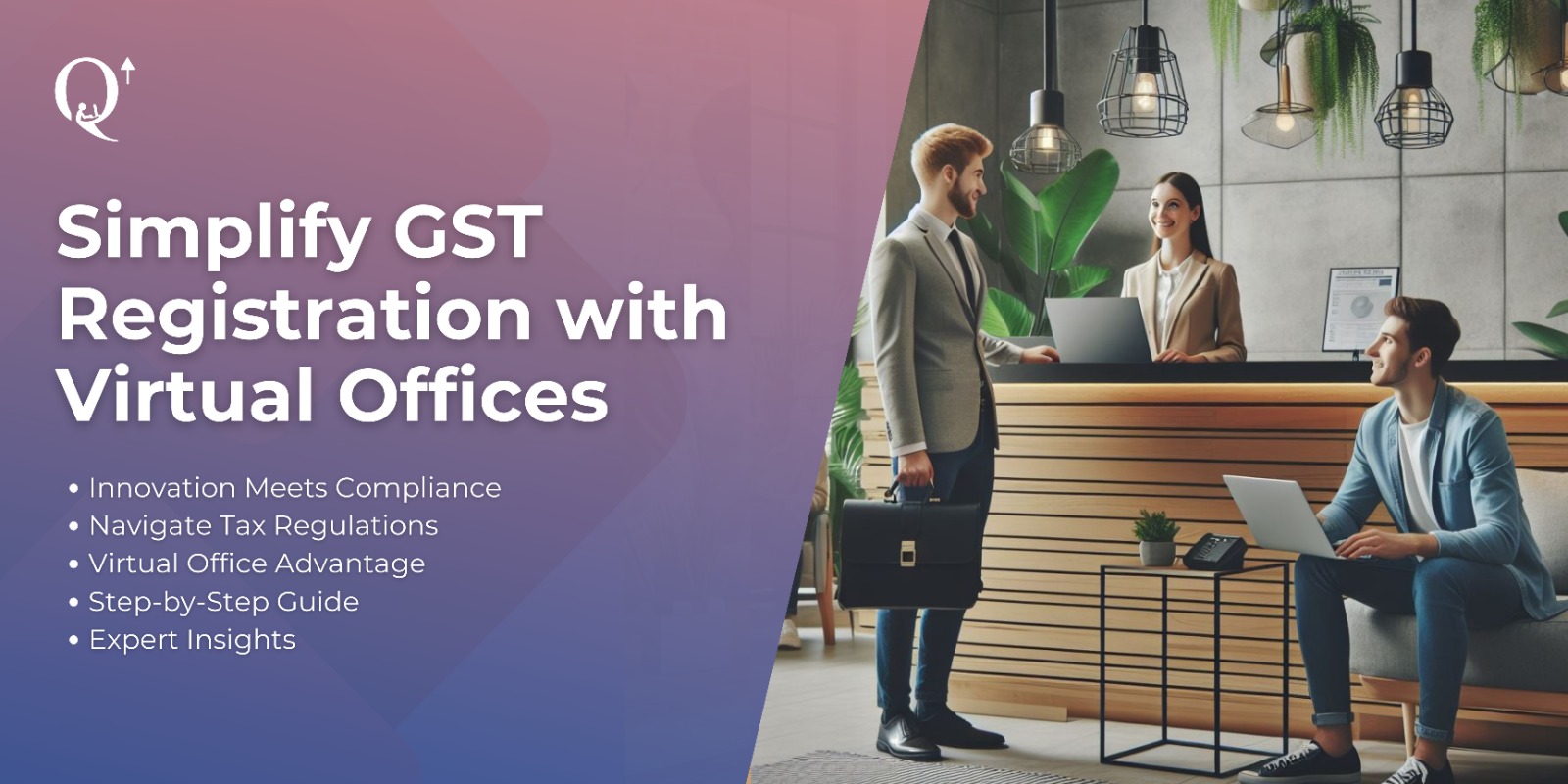Navigating the intricacies of tax regulations is crucial for any business in the bustling landscape of Indian commerce. Goods and Services Tax (GST) registration is a pivotal requirement for entities operating within India’s economic sphere.
Traditionally, securing GST registration necessitated a physical address for the business premises.
However, virtual offices have now emerged as a viable solution for businesses seeking flexibility and agility in their operations in an era of digital transformation.
Embracing the Virtual Advantage
In recent years, virtual offices have gained traction, allowing businesses to establish a professional presence without the constraints of a physical location.
This paradigm shift has extended to GST registration, wherein certain states within India permit registration with a virtual office address, subject to specific conditions.
Such innovation simplifies the registration process and caters to modern enterprises looking for cost-effective and scalable solutions.
Understanding the Process
To register for GST through a virtual office, follow a series of crucial steps. Each step ensures compliance with India’s tax regulations and maximises benefits. Below is an overview of these essential phases.
-
Eligibility Check
Before registering for GST, a business must determine if it meets the eligibility criteria. This involves evaluating annual turnover to see if it exceeds the threshold specified by the GST law, which varies depending on the type of supply and the state of operation.
Knowing this threshold is crucial because it ensures compliance and allows businesses to take advantage of the input tax credit mechanism and other benefits provided by the GST system. Identifying your eligibility early on can help prevent future complications and make business operations smoother.
-
Virtual Office Provider Selection
Selecting the right virtual office provider is a pivotal decision that can significantly impact the ease of your GST registration process and your business’s overall image. A reputable provider offers a comprehensive package including mail handling, meeting room and workspace access, and professional reception services.
With Qdesq, you can search, compare, and book the ideal virtual office in Pan India. Choosing a virtual office with us means simultaneously achieving the business’s professionalism and functionality. We have a range of providers that comply with the standards set by the Goods and Services Tax Network (GSTN) and are recognised by the relevant state tax authorities.
-
Documents and Information Gathering
Compiling the necessary documentation is a crucial step that demands attention to detail. This includes acquiring your PAN, proof of business constitution (such as partnership deeds, incorporation certificates, etc.), address proof for the principal place of business (your virtual office address), bank account details, and particulars of the authorised signatory.
These documents form the backbone of your GST application and must be accurately presented to avoid any hitches in the registration process.
-
Application Submission
Filing the GST registration application on the GST portal is a critical step that requires precision. When completing the form, the virtual office address must be listed as the principal place of business. Accuracy in filling out the application must be balanced, as discrepancies can lead to delays or the rejection of your registration.
The digital nature of this step makes it convenient but no less severe, as it requires a thorough review and verification of all submitted information.
-
Verification and Processing
Once the application is submitted, it undergoes rigorous scrutiny by GST authorities. This may include physical verification of the virtual office premises to ensure it meets the necessary regulations.
This stage highlights the importance of choosing a compliant virtual office provider, as non-compliance can significantly hinder the process. The verification aims to ensure that the business adheres to all regulatory requirements and maintains the integrity of the GST system.
-
GSTIN Issuance
Following successful verification, the business is issued a Goods and Services Tax Identification Number (GSTIN), marking a key milestone in the company’s compliance journey.
The GSTIN is essential for all future transactions, filings, and compliance under the GST regime. It enables the business to operate within the legal framework, participate seamlessly in the national market, and avail of the GST scheme’s benefits.
-
Compliance and Record-Keeping
After obtaining the GSTIN, businesses must diligently adhere to GST regulations, which include filing returns, paying taxes, and maintaining accurate records of transactions and invoices. These practices ensure the business complies with GST laws, avoids penalties, and facilitates smooth audits. Regular updates on GST laws and consultation with tax professionals can help maintain compliance and leverage the GST system effectively.
Bonus Tip – Navigating the GST registration process with a virtual office is a strategic choice for businesses seeking flexibility and a strong market presence.
Navigating the Regulatory Landscape
Staying abreast of evolving regulations and guidelines promulgated by GST authorities is integral to sustaining compliance and averting potential penalties or legal entanglements. Consultation with qualified tax professionals or legal advisors can guide your business’s unique necessities, ensuring you remain compliant and informed in a dynamic regulatory environment.
Virtual Path to Efficiency and Flexibility
Integrating virtual offices into the GST registration process in a dynamic business environment characterized by digital innovation and shifting paradigms underscores a commitment to agility and efficiency. By leveraging this progressive approach, businesses can easily navigate regulatory requirements while embracing the opportunities a virtualized operational framework presents.
This transition reduces overheads and aligns with the modern workforce’s expectations for flexibility and digital-centric operations.
Bottom Line
In essence, obtaining GST registration in India with a virtual office heralds a paradigm shift in tax compliance, affording businesses newfound flexibility and adaptability. By embracing this innovative approach, enterprises can streamline their operations, fortify compliance endeavours, and chart a course toward sustained growth and prosperity in India’s vibrant economic landscape.
Virtual offices in Gurgaon, Bangalore, Hyderabad, Chennai, Delhi, Noida, Kochi, Kolkata and other major cities offer a strategic advantage, enabling businesses to tap into new markets with minimal investment.
Embrace the future of business with virtual offices, where agility meets compliance, paving the way for unparalleled growth and success.










